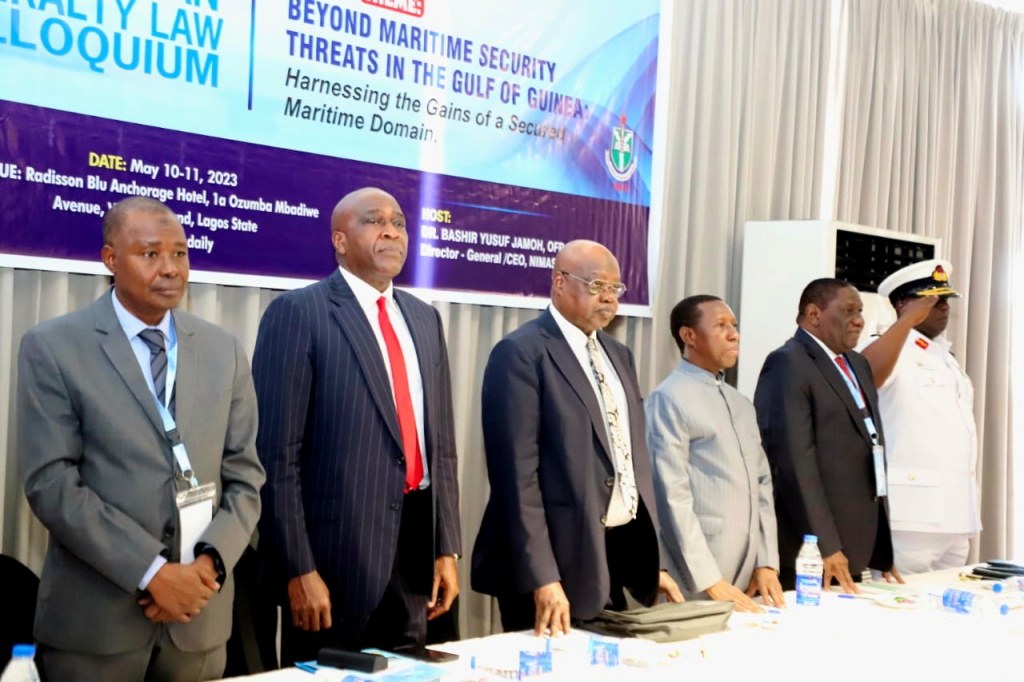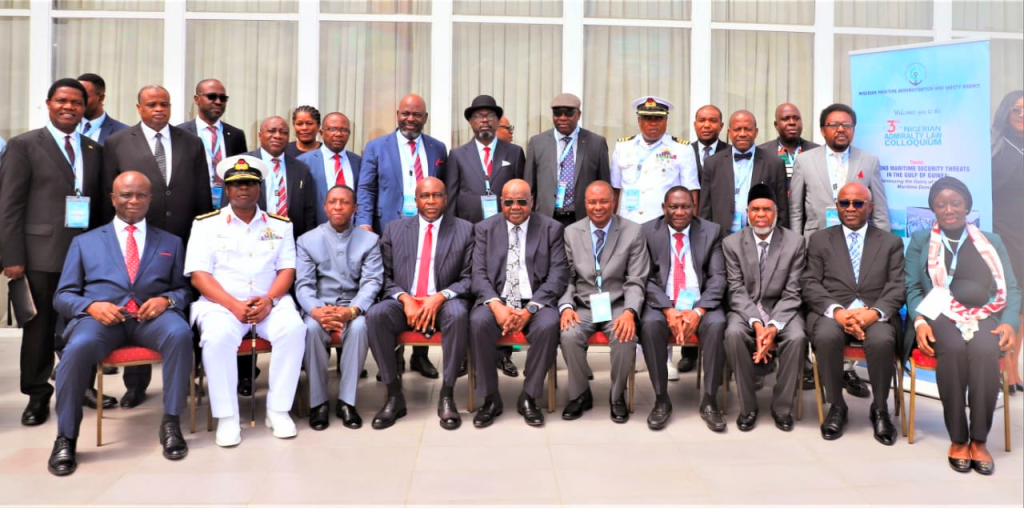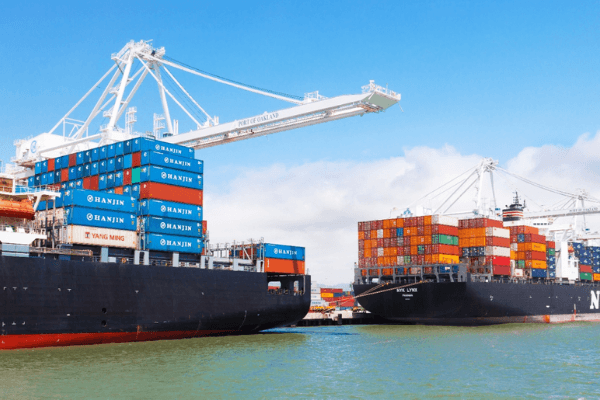—Says Secured Maritime Domain Vital to Economic Advancement
—As Jamoh Urges Investors to Harness Gains of Secured Gulf of Guinea

L-R: Hon Justice Mohammed Lawan Shuaibu JCA, Executive Director, Finance and Administration (NIMASA). Hon. Chudi Offodille Representing the Director General of Nigeria Maritime Administration and Safety Agency. Hon Justice Musa Datti Muhammad CFR, JSC, Prof. DG Nigerian Institute of Advanced Legal Studies (NIALS)Prof. Muhammed Tawfiq Lawan. Administrator of National Judicial Institution (NJI) Hon. Justice Salisu Garba and Rear Admiral Barabutemegha Jason Gbassa at the Nigerian Admiralty Law Colloquium in Lagos.
The Chief Justice of Nigeria and Chairman, Board of Governors of the National Judicial Institute, Hon. Justice Olukayode Ariwoola, GCON has stated that the judiciary has a role to play in all legal forms of fight against piracy, noting that a secured maritime domain was vital to economic development and advancement. The CJN stated this while declaring the 3rd edition of the Nigerian Admiralty Law Colloquium for Justices of the Supreme Court and Court of Appeal and Judges of the Federal High Court, Open in Lagos.
The CJN who was represented at the event by Hon. Justice Musa Dattjo Muhammad, CFR, averred that he was pleased with the 2023 edition of the Nigerian Admiralty Law Colloquium, because it was tailored towards effective and efficient adjudication of cases as well as curbing the menace of piracy within the Gulf of Guinea. He observed that the Gulf of Guinea was richly endowed, and that it was necessary for key players in the maritime sector to continually engage in constructive discussions to achieve the benefits associated with the maritime industry.
In his words, “The Gulf of Guinea encompasses eight African countries, to wit; Benin, Cote d’Ivoire, Ghana, Guinea, Liberia, Nigeria, Sierra Leone and Togo. These countries are home to about 4.5 percent of the world’s proven oil reserves and about 2.7 percent of proven natural gas reserve. Two-thirds of these reserves are concentrated within the exclusive economic zone of Nigeria, the center of gravity of the region, whose oil sector accounts for 75 percent of the state’s revenue and about 90 percent of total export. The Gulf of Guinea is richly endowed with vast reserves of hydrocarbon, mineral and fisheries resources, making it a strategic area”.
Speaking further, the CJN said that the workshop was apt, as it would create avenue for capacity building and increased maritime domain awareness. He affirmed his belief that ultimately, participants at the event would be able to drive conversations on how to maximize the benefits of the maritime sector and also generate ideas and strategies necessary for its sustenance and safety. He opined that the colloquium was a proactive measure to further expose judicial Officers to fundamental developments in Maritime Security issues, enabling them to be at par with international relevant laws and policies governing the maritime security sub-sector.
The CJN commended the Management of NIMASA under the stewardship of Dr. Bashir Jamoh, OFR, for his grit and determination in ensuring that the Agency fulfils its mandate. He noted that under Jamoh, the Agency had recorded notable improvements in maritime security and safety, especially through effective implementation of the Deep Blue Project which has, among other things, led to the impressive decline in piracy and armed robbery on the sea.
“The legal strategies being adopted by Nigeria to combat maritime piracy and armed robbery in the Nigerian waters have not gone unnoticed. This is evident in the creation of the Nigeria’s Suppression of Piracy and other Maritime Offences Act (SPOMO) 2019. Before the advent of the 2019 Anti-Piracy Act, there were no specific ‘laws to determine the context of piracy in Nigerian waters and legal enforcement in response to maritime insecurity. Thus, the 2019 Anti-Piracy Act is an important step in securing the country’s coastline and seas. It has also ensured an increased level of transparency and accountability in the maritime sector, by strengthening the governing institutions to attract investment capital through implementation of regulatory and fiscal framework for the Nigerian maritime industry. This will encourage foreign investors to have a sense of trust in the Nigerian Maritime industry, which will enhance revenue for the government while ensuring a fair return on investment”, the CJN said.

A cross section of Participating Justices of the Supreme Court and Federal Court of Appeal and Judges of the Federal High Court, and other stakeholders at the Nigerian Admiralty Law Colloquium in Lagos
In his remarks, the Chief Justice of the Federal High Court of Nigeria, Hon. Justice John T. Tsoho commended the Management of NIMASA for its roles in enhancing the development of maritime law and its knowledge. Justice Tsoho who was represented by Honorable Justice Adekunle Olayinka Faji, noted that since the Federal High Court was the court with primary jurisdiction in maritime matters, Federal High Court would always support relevant legislations that would ensure efficiency and effectiveness in harnessing the gains in the maritime industry.
“The price of peace and freedom is however vigilance. If we are to harness the gains of a secured maritime domain, we must continue to build capacity and fine-tune our laws. It is in this connection that I must state that work has been concluded on the new Admiralty Jurisdiction Procedure Rules and the text has been sent for gazzetting. It is thus only a matter of days before the new Rules will come into force. The Nigerian Maritime Law Association (NMLA) is also at work on the new Admiralty Jurisdiction Act. All these legislative efforts are geared towards enhancing the potentials of our country in the Deep Blue Project and the overall growth of our economy”, he said.
In his opening remarks, the Director General of NIMASA, Dr. Bashir Jamoh, observed that it was gratifying to note, that the Admiralty Workshop had moved so rapidly that so soon, after a dark period when all discourse centered around insecurity and piracy in the Gulf of Guinea, NIMASA and all stakeholders in the maritime industry were today sufficiently emboldened to move the trend of engagement to another level, as the maritime industry gave consideration to the vital issue of harnessing the gains of a secured maritime domain.
Speaking further, Jamoh, who was represented by the NIMASA’s Executive Director of Finance and Administration, Hon. Chudi Offodile, stated that a well-developed blue economy would be strong enough to service Nigeria’s annual budget, because it encompasses all economic activities associated with the oceans and seas. However, he observed that despite these endowments and abundant resources in the nation’s oceans and seas to back her economic diversification and development drive, Nigeria was yet to take full advantage of the emergent ocean economy to expand its revenue base.
According to him, “Since the concept of the blue economy began to gain traction decades ago, maritime nations have been harnessing the full benefits of the ocean economy by protecting their oceans and seas, which is why NIMASA is working tirelessly to secure our waters and the Gulf of Guinea. The time has come for us as a nation to build on the successful achievement of security in the Gulf of Guinea and work intentionally to harness the profitability of our maritime space”.
Present at the Colloquium was the Chief of Naval staff, Vice Admiral Awwal Z. Gambo, who was represented by Rear Admiral BJ Gbassa, the Chief Justice of Lagos State, Hon. Justice Kazeem Alogba, the Director General of the Nigerian Institute of Advanced Legal Studies (NIALS), Professor Muhammed Tawfiq Ladan, Sir Hon. Justice Biobele Abraham Georgewill, the Chief Justice of Anambra State, Hon. Justice Onochie Anyachebelu, Dr. Emeka Akabogu, Mike Igbokwe, SAN, amongst other Justices and Maritime stakeholders.
Themed, “Beyond Maritime Security Threats in the Gulf of Guinea: Harnessing the Gains of a Secured Maritime Domain”, the 3rd edition of the Nigerian Admiralty Law Colloquium was organized by NIMASA in collaboration with the Nigerian Institute of Advanced Legal Studies (NIALS) and the National Judicial Institute (NJI), for Justices of the Supreme Court and Appeal Court and Judges of the Federal High Court of Nigeria.
Osagie Edward
Assistant Director, Public Relations, NIMASA
May 11, 2023


